By: Izumi Hasegawa March 13, 2017
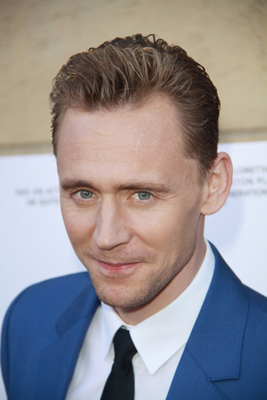
When Tom Hiddleston enters the room he is tall, handsome, and seems a bit mysterious. While he is also every bit the English gentleman, I was pleasantly surprised that he really likes to talk. At the roundtable of his new film Kong: Skull Island, he was gracious and more than happy to sit with the press to answer interview questions, which is becoming a rarity with many actors lately. We chat with Tom about the film, nature, and what makes a hero and a villain appealing to play.
Q: I really liked the underlying message in the film surrounding the American soldiers coming to an island and dropping a bomb without any respect for nature, and Kong’s response to that. How would you describe your relationship with nature and the planet?
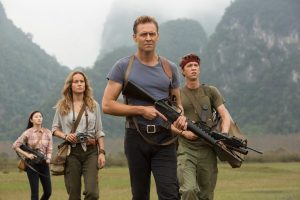 There is a theme in Kong Skull Island about the power and majesty of the natural world. I think a healthy connection with the natural world actually makes us more human as opposed to less. I think right now I personally feel that people feel very reassured by nature because it makes us feel small and that’s a good thing for human beings and society. I’m reading a book at the minute called “Sapiens: A Brief History of Humankind” by Yuval Harari and it really takes the long view about the history of our planet and that the human race has had quite a short primacy. Before us there were dinosaurs, mega fauna, and maybe after we’re gone there will be more again. I love that most recent series “Planet Earth II” by the BBC and David Attenborough and you see images of lions, buffalos, lynxes and giraffes in the wild. People I think take huge comfort in nature.
There is a theme in Kong Skull Island about the power and majesty of the natural world. I think a healthy connection with the natural world actually makes us more human as opposed to less. I think right now I personally feel that people feel very reassured by nature because it makes us feel small and that’s a good thing for human beings and society. I’m reading a book at the minute called “Sapiens: A Brief History of Humankind” by Yuval Harari and it really takes the long view about the history of our planet and that the human race has had quite a short primacy. Before us there were dinosaurs, mega fauna, and maybe after we’re gone there will be more again. I love that most recent series “Planet Earth II” by the BBC and David Attenborough and you see images of lions, buffalos, lynxes and giraffes in the wild. People I think take huge comfort in nature.
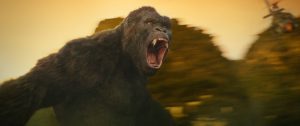 Q: When was your last outdoor adventure?
Q: When was your last outdoor adventure?
[Laughs] Thanksgiving 2015, as a British citizen I had nowhere to go, and I stayed in Hawaii and I learned to surf; which is a beautiful place to do it. The waves are very gentle there and the ocean is very warm. That’s how I spent my Thanksgiving. I’d never surfed before.
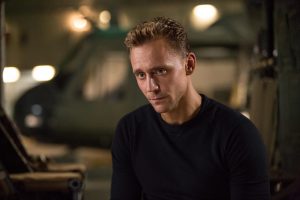 Q: How long did it take you to stand up on the board?
Q: How long did it take you to stand up on the board?
I was up on the first day. That’s probably the waves; it has something to do with the Hawaiian waves, not with me. There are sea turtles out there, which is always lovely.
Q: Conrad (played by Tom Hiddleston) has a very interesting relationship with Mason (Weaver, played by Brie Larson). They are working towards one common goal together maintaining a platonic relationship throughout the film. I found that angle refreshing. What were your thoughts and how was working with Brie?
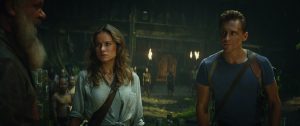 I loved working with Brie! I remember very early on, both of us are kind of singing from the same hymn sheet about how some of these films can work if you reinterpret myths. There’s something about cinema that’s (bred) with myth. Both Conrad and Weaver are iconoclasts. They question the status quo and they are loners I think to some extent and that’s appealing. Many of the other characters are in service of the United States Military. Conrad is British SAS and Weaver is a photojournalist so in the crew they occupy a questioning, independent viewpoint.
I loved working with Brie! I remember very early on, both of us are kind of singing from the same hymn sheet about how some of these films can work if you reinterpret myths. There’s something about cinema that’s (bred) with myth. Both Conrad and Weaver are iconoclasts. They question the status quo and they are loners I think to some extent and that’s appealing. Many of the other characters are in service of the United States Military. Conrad is British SAS and Weaver is a photojournalist so in the crew they occupy a questioning, independent viewpoint.
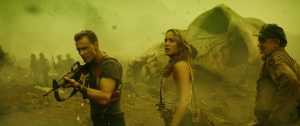 I loved as we were developing the character; I loved the idea that, specifically in counter point to Samuel L. Jackson’s (plays Colonel Packard) character. You have two highly skilled military commanders. Colonel Packard is a commander in the sky. Captain Conrad is a commander on the ground with huge capabilities in reconnaissance, the recovery of lost soldiers, jungle warfare and they diverge in opinion and Conrad can disagree with Packard without being insubordinate. That was important that you had these two equally skilled, experienced characters (that) can have a difference of opinion about what to do next without somehow starting a mutiny.
I loved as we were developing the character; I loved the idea that, specifically in counter point to Samuel L. Jackson’s (plays Colonel Packard) character. You have two highly skilled military commanders. Colonel Packard is a commander in the sky. Captain Conrad is a commander on the ground with huge capabilities in reconnaissance, the recovery of lost soldiers, jungle warfare and they diverge in opinion and Conrad can disagree with Packard without being insubordinate. That was important that you had these two equally skilled, experienced characters (that) can have a difference of opinion about what to do next without somehow starting a mutiny.
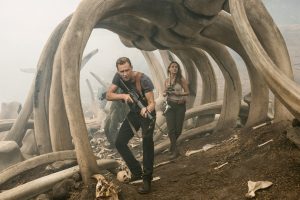 Q: What’s really interesting about your career is that you are a part of these massive budget blockbusters and also doing projects like “High Rise”. Is there a balance that you have to find? Is there a certain side that appeals to you more?
Q: What’s really interesting about your career is that you are a part of these massive budget blockbusters and also doing projects like “High Rise”. Is there a balance that you have to find? Is there a certain side that appeals to you more?
It’s interesting; I think there’s a greater difference for the audience than for the actors. When a new project comes along, I listen quite carefully to my first instinct. I want to know that the experience is going to be challenging and exciting. I want to know that part of me will be drawn to doing something new, and also (there’s) the satisfaction of intellectual curiosity. I loved reading around this film even though my job is to turn up, pick the tallest tree and imagine that I’m staring into the face of Kong. But I read Michael Herr’s “Dispatches” again. A seminal work on the Vietnam War, and I read this book “The Tracker” by Tom Brown Jr. about a man who grew up in the pine barrens of New Jersey and learned how to track animals from his best friend’s father who was a Native American tracker.
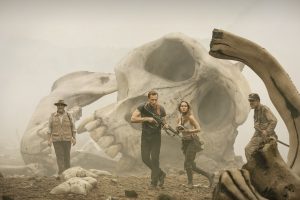 I loved the physical training, I loved choreographing the action sequences, as well as thinking about the theme of the power of nature and the arrogance of man thinking that nature is in our control, when actually it’s the other way around. All of it coalesces into an experience I found really satisfying and with each project there’s always something like that in there.
I loved the physical training, I loved choreographing the action sequences, as well as thinking about the theme of the power of nature and the arrogance of man thinking that nature is in our control, when actually it’s the other way around. All of it coalesces into an experience I found really satisfying and with each project there’s always something like that in there.
Q: You’ve played a villain in Loki and a hero in this movie. Which one is more challenging and personally enjoyable as an actor?
They are both different. They both express different parts of me. Simply, there’s less time in hair and makeup for playing Conrad. The difference between a hero and a villain is actually that they just make different choices. Loki could be a hero if he made better choices and Conrad would be a villain if he made different choices. It’s always about the choices that people make that determine who they become.
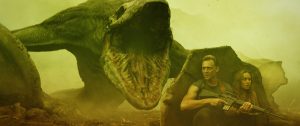 Q: You spoke about his conflict before but also that he might just be crazy. At this point, where is he?
Q: You spoke about his conflict before but also that he might just be crazy. At this point, where is he?
I think there’s some fatal flaw in his makeup that will never change. I think from playing it successively, consciously, he probably wants to change but I think he knows he can’t. I don’t know what that’s about, but if you’re a human being, I would prescribe a course of therapy, but he’s a Norse god, he’ll represent something. He represents something mercurial, fickle and changeable. The whole point of Loki is that you must never trust him, because he’s always going to change his mind, because there’s something in him, the god of mischief, (which) is delighted by chaos. Most human beings are terrified of chaos.
Kong: Skull Island opens in theaters nationwide on March 10th. For theatre locations and ticket info, please visit the film’s official website at, http://kongskullislandmovie.com/
Interview by Izumi Hasegawa – @HNW_Izumi
Edited by: Jody Taylor – @RealJodyTaylor
Follow Us: What’s Up Hollywood at @WhatsUpHWood
